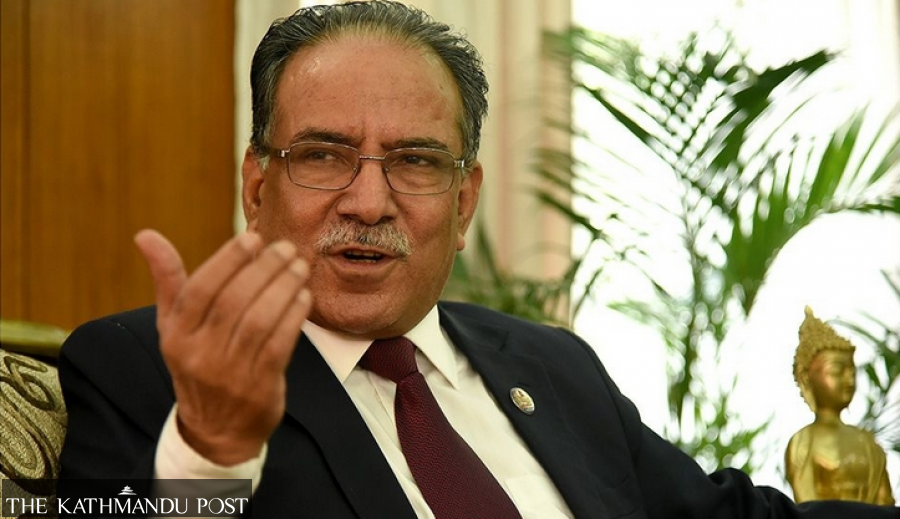Politics
Maoist party fears becoming irrelevant, stresses reforms
Party’s central committee meet warns Maoist Centre could turn into a reactionary party.
Tika R Pradhan
The first central committee meeting of the Communist Party of Nepal (Maoist Centre) held after it was revived on March 7 by the Supreme Court has concluded that the party has become irrelevant as it is no different from the other political parties.
While concluding the meeting, Chairman Pushpa Kamal Dahal, who has been leading the party for the last three decades, said the Maoist party will lose its significance unless it improves on its ongoing activities.
Dahal said that his party may look alright but it is not different from other “bourgeois reactionary parties”.
“If we continue with our current activities, this party will be of no use. Communist parties in the world have fallen,” a central committee member quoted Dahal as saying at the meeting. “If we cannot be honest with our class and principles, we should rather involve ourselves in research or write books by dissolving the party.”
Dahal’s candid statement has impressed many of the central committee, though they are not yet convinced that the party's leadership will change or reform itself.
“We discussed at length that our party in its present form is not necessary as there are many similar ones,” said Lekhnath Neupane, a central committee member. “Top leaders have promised to reform themselves to bring change in the party.”
He, however, said that the party leaders would believe the words only after the top leaders start acting accordingly.
The meeting concluded that the party would be able to find a way to reform itself before the upcoming national conference scheduled for January 25-27 next year.
During the two-day long meeting, leaders raised a host of issues for bringing reforms to the party. They suggested that the party could be developed into a centre of the left parties but for that the leaders need to change their existing behaviour.
The party also concluded that the risk of regression still exists therefore it needs to work honestly to implement the constitution.
“Although the regressive moves of the previous [Oli] government have been defeated, such risks have not gone away completely,” said Narayan Kaji Shrestha, party’s spokesperson, following the meeting held at a party palace.
The central committee meeting of the Maoist Centre was the continuation of the one that was held on March 15-16 after the court’s verdict.
The March meeting had decided to retain the 200 central members who were included during the merger with UML in May 2018. Among them there are only 179 members but the party has amended the statute to increase it to 299.
Chairman Dahal had presented an eight-page political document on Saturday and eight groups had presented their views on it Sunday.
Dahal had proposed that the existing coalition of leftist and democratic parties would continue until the upcoming polls but the leaders have questioned whether that would be the right thing to do.
“The meeting has amended Dahal’s proposal saying that the alliance would continue to safeguard the constitution and democracy,” said Neupane.
The Dahal-led Maoist party has long been lobbying for a directly-elected President but due to its weakened strength in the second Constituent Assembly, the party was unable to enshrine the idea in the constitution. But the central committee meeting has again called for a directly-elected presidential system and a proportional representation election system saying they are needed for resolving the existing problems in governance. However, the issue has not been highlighted citing that it could affect the existing alliance of the left and democratic forces.
The meeting endorsed Dahal’s political document with some corrections and the party’s statute. As per the interim party statute, the party will now have 299-strong central committee, a 100-member politburo and a 33-member Standing Committee. Now the Maoist party will have office-bearers including vice-chairperson, general secretary, deputy general secretary and secretary like in the CPN-UML.
The party, which waged a decade-long insurgency to bring change in society, has also decided to make its party committees inclusive with 35 percent women, 15 percent Dalits and at least 20 percent youths.
In line with the federal system, the party has decided to change the existing executive district committees into district coordination committees and further empower the committees in provinces and local units.
According to insiders, the party has decided to form a mechanism to support the party’s ministers serving in the federal and provincial governments to help them perform better. “We have decided to focus on education, health and the programmes for the peasants,” said a central committee member asking not to be named.




 8.67°C Kathmandu
8.67°C Kathmandu














